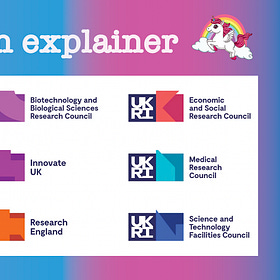10 of the most WTF PhDs - funded by the Arts and Humanities Research Council
AHRC has been allocated £207 million in funding for the years 2022-25
In this article I’ve laid out 10 very strange PhDs funded by the Arts and Humanities Research Council (AHRC).
Unfortunately there are A LOT of these (as you’ll see at the end of this article) - not that I am trying to troll my readers, but to build the case for defunding AHRC. It has been given £207 million in taxpayer funding for 2022-25 and spent it on the most extraordinarily wasteful projects.
Before looking at the PhDs below, I’ve put this explainer below (which explains how AHRC receives its funding) in case needed:
UK Research and Innovation: An explainer
UK Research and Innovation (UKRI) is one area I cover the most in my journalism. So much so that I thought I would do a quick guide that can be used as a reference - should anyone want to look at it while reading one of my pieces about the numerous studies it funds.
Plus, to add that PhDs (classed as studentships) tend to last 3.5 years and cost around £20kpa.
Lastly, many thanks to Matt Goodwin for his generous write-up of Woke Waste today. Great to have his support:
Without further ado… 10 of the most WTF PhDs funded by AHRC:
Towards an ecofeminist ecriture feminine : poetic responses to climate grief under patriarchal and anthropocentric hegemony | Oct 23 - Mar 26
This thesis uses writing in the form of an ecofeminist 'ecriture feminine' - writing centring the language of the oppressed and repressed 'feminised other'. While reflecting on the interconnectedness of anthropocentrism and patriarchy, this thesis presents climate grief as a narrative of entanglements. Recognising hybrid writing as characteristic of 'ecriture feminine', I use poetic "autotheory", a hybrid genre of writing. Inspired by Maggie Nelson's autotheoretical work 'The Argonauts' (2015), I use poetic verse and lyric essays to present accounts of climate grief.
Trowels, Trenches and #TransRights: Intersections of Archaeology, Transphobia and Liberation Politics | Sept 23 - Jan 27
he [sic] proposed research project will establish a framework for a fully transgender inclusive archaeology that tackles normative interpretations of the past and supports the transgender community in a period of heightened attacks in the present. Building on existing archaeological data and queer theories of gender, the project will collect qualitative data on attitudes and experiences of transgender individuals in relation to archaeology. These will be combined to create an online resource and exhibition to reframe archaeology as a safe, inclusive space, reducing harm to communities and imagining different ways to live in the past and present.
The researcher is Owen Hurcum (below), who’s very vocal on X and I have previously written about here.
Queering the Porn Theatre: Sexual Spaces in New York City, 1967-1980 | Sept 19 - Mar 25
Using a historical reception studies approach adopted by Janet Staiger (1992) and Barbara Klinger (1994), this study will utilise periodicals, trade journals, city planning records, and documentation from organisations such as the Motion Picture Association of America and the Adult Film Association of America to trace discursive struggles between tastemakers such as the New York Times, New York's mayoral office and city planning committees, and the diverse populations of Times Square during the 1960s and 1970s. This material will be sourced from, for example, the New York City Municipal Archives, the Popular Culture Archive at Bowling Green State University, and the Kinsey Institute at Indiana University.






